Is Dropshipping Dead In 2024: Is It Too Late To Start Now?
Despite the global e-commerce boom, there has been a lot of “buzz” lately about dropshipping being dead. The COVID-19 pandemic has contributed to a more digitalized world. It has resulted in changes in online shopping behaviors that will surely have lasting effects.


Table of Contents
- Is Dropshipping Really Dead? Let’s Explore It Together
- Is Dropshipping Dead?
- Two Main Reasons Why Dropshipping In 2024 Is Considered Dead?
- The No. 1 Tool for all dropshippers – now with AI
- Dropshipping Pros and Cons
- Is It Too Late To Start Dropshipping In 2024?
- How To Succeed With Dropshipping In 2024?
- FAQs about Dropshipping
- Conclusion
Is Dropshipping Really Dead? Let’s Explore It Together
Undeniably, I am seeing a drastic shift from in-store to online shopping. Faced with store closures and stay-at-home orders, we are relying on the internet more than ever for buying goods.
As a result, more and more businesses are trying to embrace digital transformation and adapt to the “new normal”. The main discussion has revolved around the question of whether dropshipping is dead or not.
Is Dropshipping Dead?
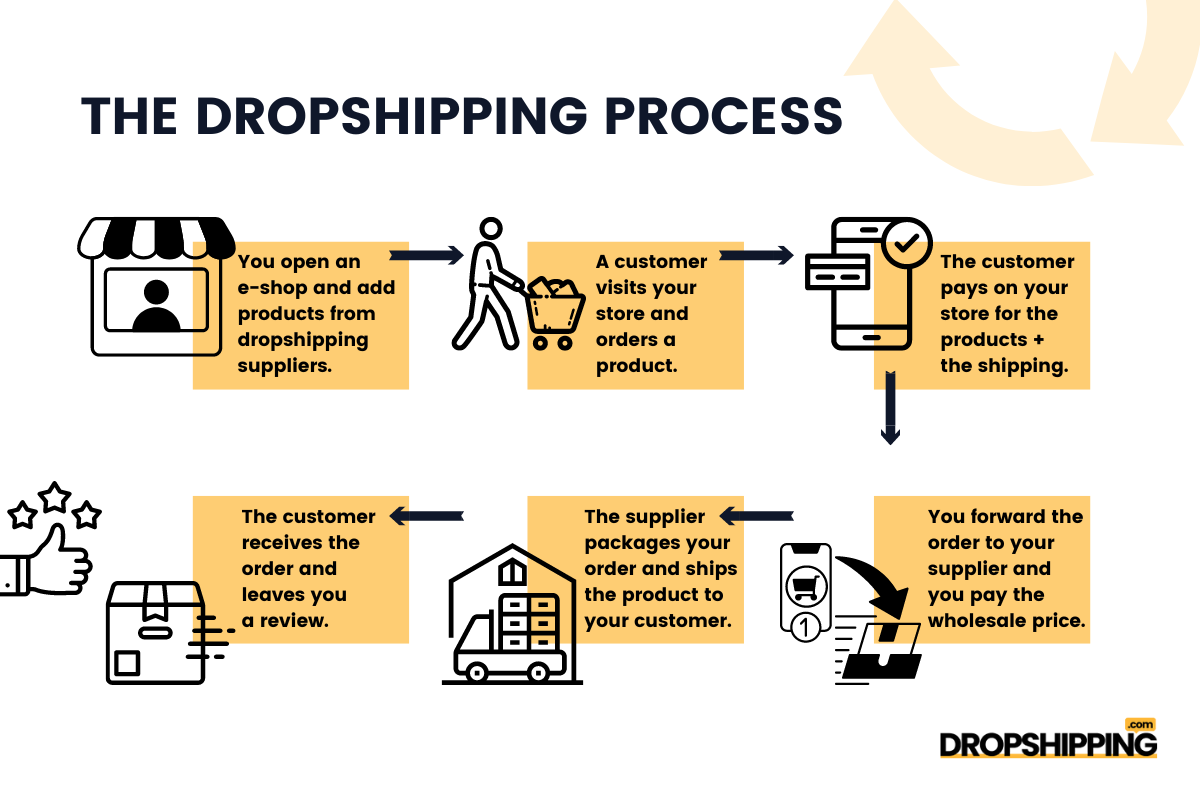
Despite some skeptics claiming its demise, dropshipping is far from dead. While the landscape has evolved and new challenges have emerged, dropshipping continues to offer opportunities for those willing to adapt and innovate. First, things first, NO, Dropshipping is definitely not dead.
In fact, recent dropshipping statistics indicate that the global dropshipping industry is poised to hit $243.42 billion in 2023. Despite this, the dropshipping market is anticipated to expand further, reaching $301.11 billion in 2024 and $372.47 billion in 2025.
However, the key to success lies in understanding the shifting trends, leveraging new technologies, and implementing effective strategies to stay ahead in this competitive market.
So, instead of dismissing dropshipping as a thing of the past, keep reading to explore the reasons why it remains a viable option for ambitious entrepreneurs in 2024. In fact, let’s use it right now, I will type in “dropshipping” on Google Trends and see how it goes.
Google Trends will let you know that the dropshipping business model has witnessed a significant increase over the past few years. In fact, let’s use it right now, I will type in “dropshipping” on Google Trends and see how it goes. Wow, drastically grown since 2022.
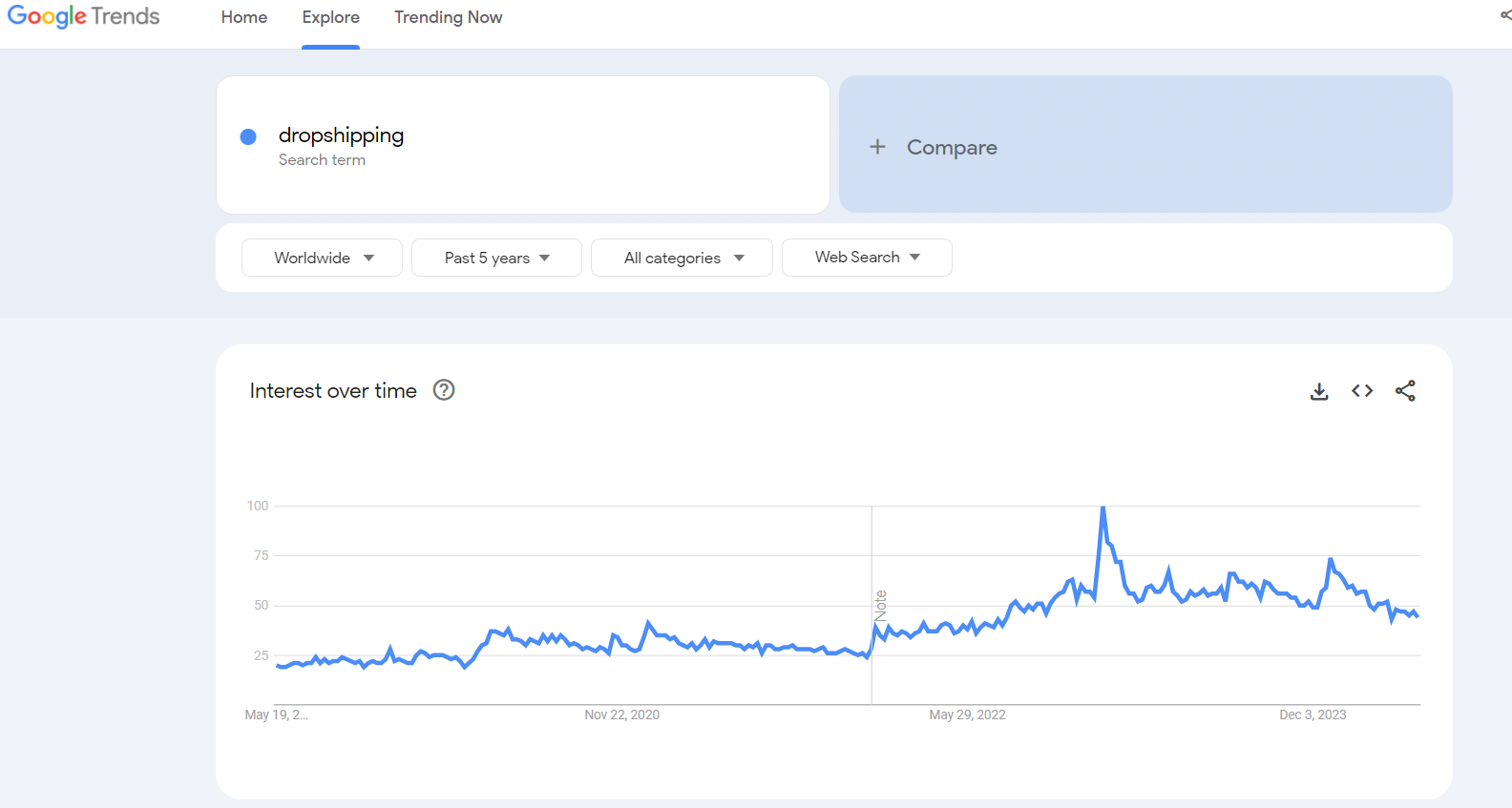
Although dropshipping is quite popular in 2024, your success in the industry depends on your ability to adapt as a new e-commerce entrepreneur.
In short, dropshipping in 2024 is still working if you are willing to approach it the right way and follow the perfect strategies.
👉 Learn How To Start Dropshipping With No Money & Quit 9 To 5.
IDEA: Learn more about the concept of Reverse Dropshipping!
Two Main Reasons Why Dropshipping In 2024 Is Considered Dead?
Before explaining the best strategies to succeed in dropshipping in 2024, let’s see why this business model is considered dead in the first place.
❌ It is fairly easy to enter the market
Both online and brick-and-mortar stores usually require a lot of investment to develop, manufacture, and source goods.
Furthermore, costs related to maintaining a physical presence, holding inventory, and packaging can add up!
On the other hand, the idea of selling goods online without holding any inventory or dealing with shipping appeals to many, particularly those just starting out.
Dropshipping has a lower barrier to entry since the dropshipper does not have to invest in warehousing or manufacturing.
This means that this business model requires a low initial investment. And that’s why it seems like an amazing opportunity for any new online merchant.
What’s more, the rise of technology is lowering the barrier to entry. This enables anybody with a laptop and a good internet speed to start a dropshipping business.
Let’s go through an example.
For instance, richest dropshippers talk about how dropshipping is not a get-rich scheme, and that you should definitely make an effort to succeed.
For example, At 18, Cole Turner dipped his toes into dropshipping with a goal to pocket some cash. His initial attempt, a store focusing on plants and pottery, didn’t quite take off.
Undeterred, he switched gears to a general store, offering various items to different folks. The turning point came when he shifted his focus to selling jewelry online. Leveraging niche marketing and Facebook ads, he raked in more than 75,000 dollars in sales.
Seeing an opportunity, he sold his successful jewelry store to a Facebook entrepreneur for 20,000 dollars. Cole teamed up with a partner for a new dropshipping venture, identified profitable products, and applied his marketing savvy to push sales beyond 700,000 dollars.
Buoyed by this success, Cole launched yet another store. This time, he tuned into what people wanted and struck gold with a popular homeware item. With clever Facebook advertising, the store rolled in significant profits, tallying over 2.1 million dollars in sales since March 2019.
So, as he suggests, never give up! Make mistakes, risk, try out, and succeed.
💡 Tip: Learn How To Escape The Rat Race The Real Way? – Leaving The 9 To 5.
❌ The market is saturated and the competition is fierce
The dropshipping market is saturated due to the low barrier to entry and the low initial investment requirement. Since very little capital is required to start a dropshipping business, many people are trying their luck at the dropshipping market.
And this means a lot of competition. Some even believe that there is no space for new businesses and that all the niches that an online merchant can sell in have been taken over.
But this does not have to be super-dramatic. Fierce competition does not mean the end of the world.
If you are willing to learn and invest time, you can definitely survive in the cruel competitive market and beat the competition.
Plus, there are various Competitor analysis tools that can help you spy on your competitors, and develop better marketing strategies on your own. For example, I am personally using Semrush. Thus, Semrush’s Organic Research tool’s “Competitors” report to find organic competitors. So, you can start by entering your domain and clicking “Search.”
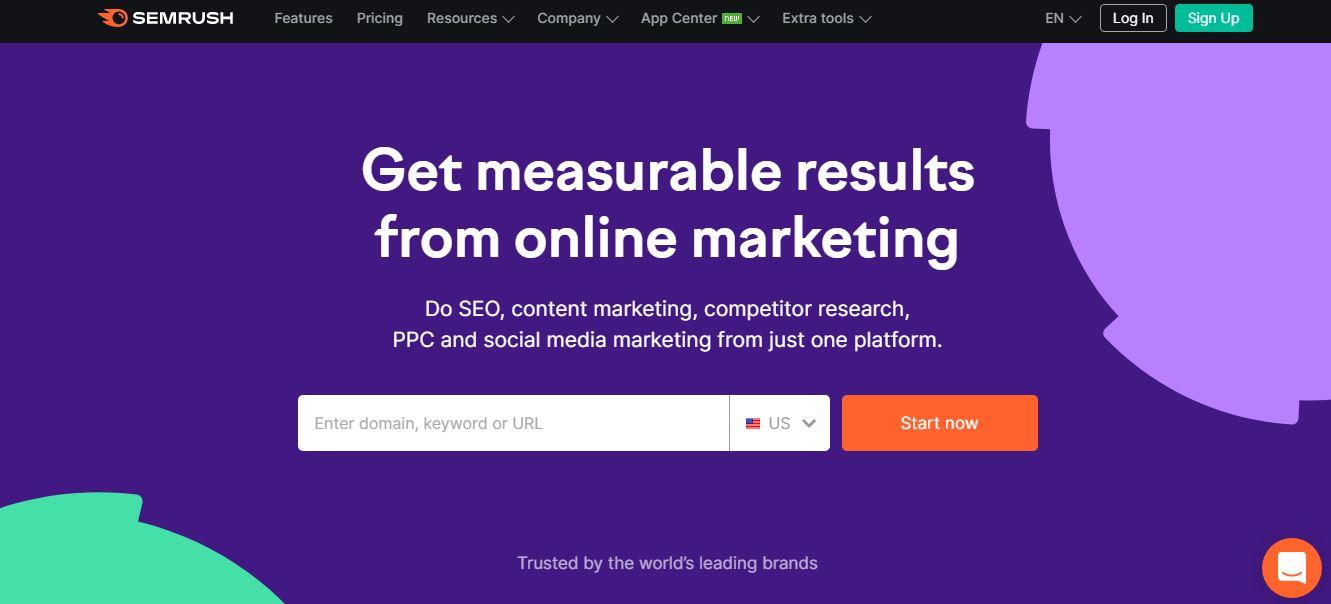
Hence, in the “Competitors” tab you can view a list of organic competitors sorted by Competition Level.
Dropshipping Pros and Cons
Dropshipping is a type of online retail business wherein the drop shipper does not keep the products they sell in stock. At first glance, for many people, it seems easy to become dropshipping entrepreneurs.
But the truth is that this e-commerce business model is not an automatic path to success.
Therefore, before entering the market, you need to know the dropshipping pros and cons. You need to see if the advantages outweigh the disadvantages.
Then, you can decide if dropshipping fits your business goals. You can read my article to learn more about the pros and cons of dropshipping.
Pros
✅ Low Startup Costs
Starting a dropshipping business comes with a significant perk – low startup costs. Unlike traditional retail, you don’t have to invest in inventory upfront.
Thus, this means no worries about warehousing and storage expenses. The money you save on overhead costs can be redirected to other critical areas of your business.
Keep in mind, that while there are some costs associated with building a dropshipping store, like finding a domain or using dropshipping tools, there are also many free tools available.
Also, your overall costs depend on your choices, such as subscription plans and marketing tools.
✅ Low Inventory Costs
In the dropshipping world, we don’t deal with inventory. This translates to low inventory costs.
Personally, I appreciate not having to spend a large sum on purchasing and storing products. I only pay for items once I’ve received payment from customers, reducing the risk of holding unsold inventory.
It’s worth noting that despite not maintaining inventory, dropshippers may still incur costs related to their business operations, such as supplier prices, dropshipping platform fees, and shipping costs.
For, example, if you need help tracking your inventory, I recommend you try Inventory Source automation software. 👇

✅ Lower Order Fulfillment Costs
Good order fulfillment is essential, and dropshipping excels here. With no need to hold inventory, you benefit from lower order fulfillment costs compared to other business models.
Dropshipping allows you to avoid the risks and expenses of excess inventory, and the entire process, from picking to shipping, is handled by your dropshipping suppliers.
This not only saves costs but also provides comprehensive reports and analytics for better business management.
For instance, I am personally utilizing ShipBob for my order fulfillment. Thus, it really helps me lower order fulfillment costs. 👇
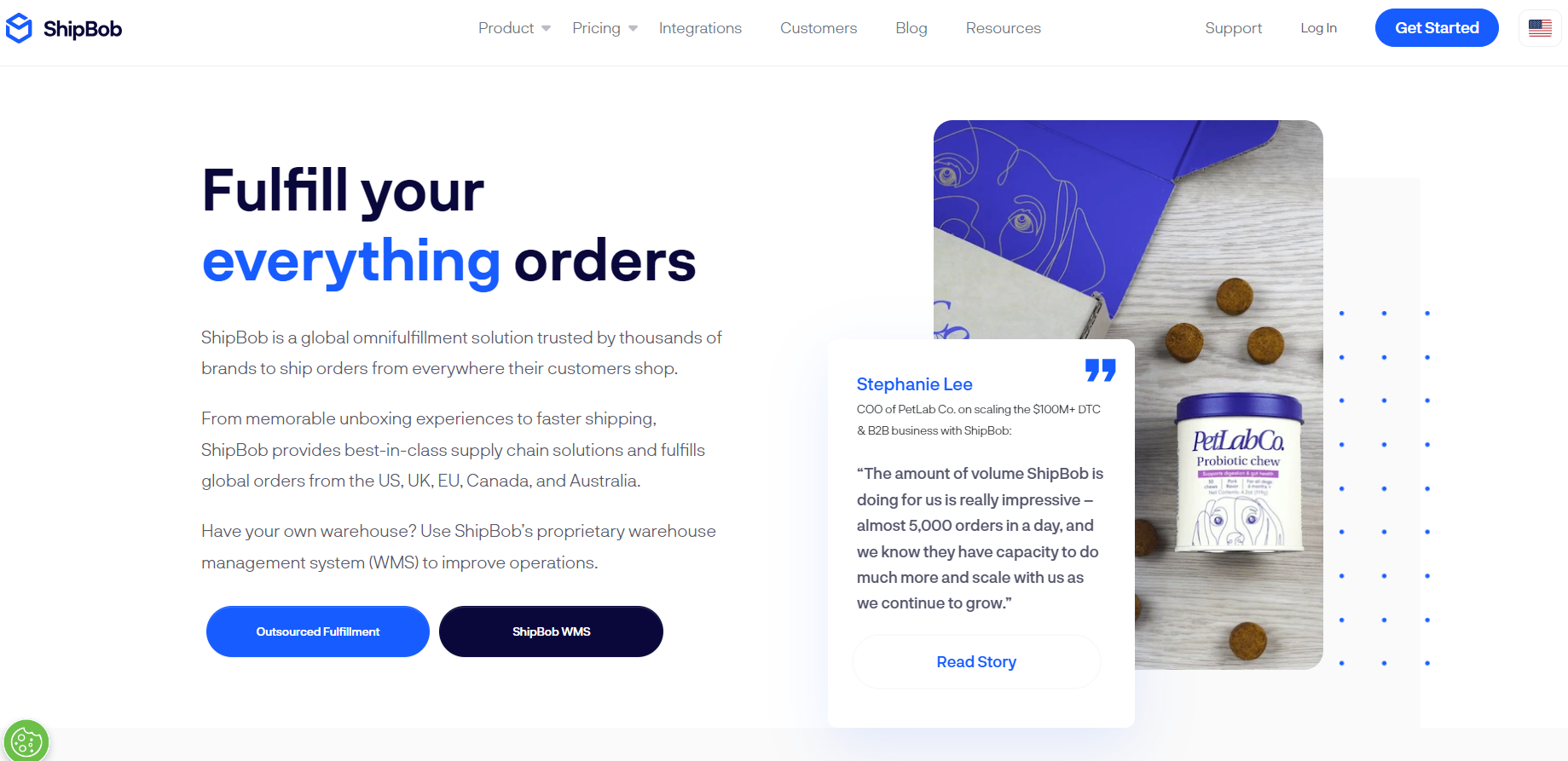
✅ Wide Range of Products
The variety of products available in dropshipping is a major plus. From lucrative niches to accessing a vast inventory from multiple suppliers, you have the flexibility to offer a diverse range of products without the hassle of stocking inventory.
Additionally, product research tools like Adserea, Sell The Trend, and AutoDS can be a game-changers, helping you find winning products by analyzing market prices, engagement, customer analysis, and more.
✅ Scalable Business Model
Dropshipping’s scalability is a strong point. Without the burden of physical inventory management, scaling operations by adding new products or entering new markets becomes much simpler.
Growing dropshipping businesses can leverage sales volume to negotiate better pricing and terms with suppliers, leading to increased profit margins.
So, dropshipping is not dead at all, but it is very scalable.
✅ Flexible Work Schedule
The dropshipping model offers a unique perk – a flexible work schedule.
Say goodbye to the constraints of physical inventory management and order fulfillment tasks, giving you the freedom to work from anywhere.
The absence of physical inventory management also saves time, allowing you to focus on crucial aspects like marketing, customer service, and expanding your product range.
Cons
❌ High Competition
Starting with a positive mindset is crucial, especially when launching an online store. However, the dropshipping business is quite accessible, attracting many entrepreneurs due to its profitable niches.
Be prepared for fierce competition. It’s not all gloom, though—unique marketing techniques and paid advertising can help you stand out.
However, I must say, do not worry! I am also in a highly competitive dropshipping market, and by using the proper tools, I simply win my competition. For instance, I am personally using SpyFu to get data for my competitors. 👇
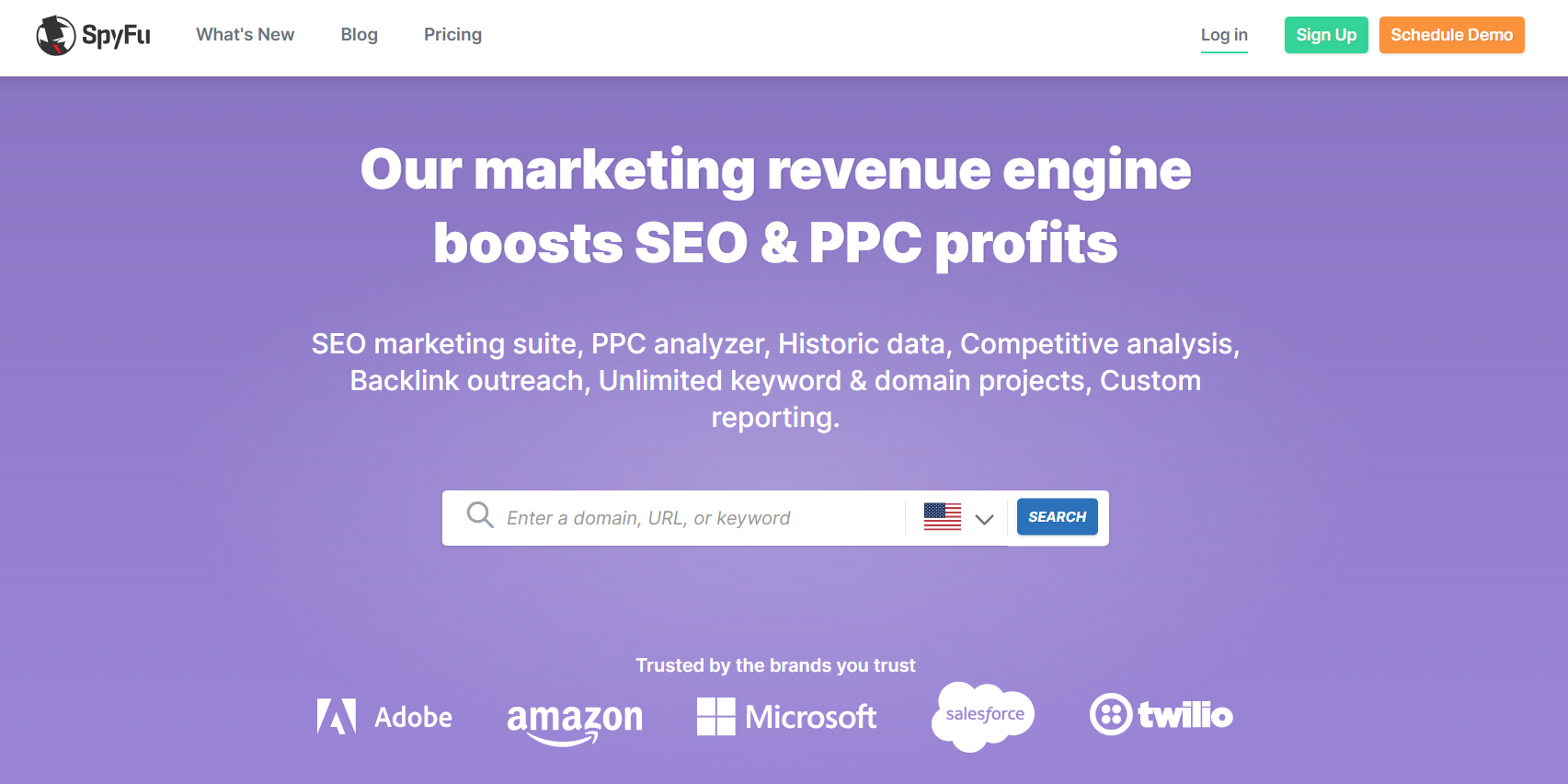
Additionally, by using this tool, I easily keep track of how certain keywords are performing and quickly identify who my online competitors are. Moreover, it simplifies the task of investigating PPC campaigns and provides detailed information about the backlinks used by competitors.
❌ No Control Over Inventory
This is a significant issue, often stemming from choosing the wrong dropshipping suppliers responsible for inventory management, packing, and shipping.
Problems with inventory directly affect you, as customers will turn to you for issues like defects or delays.
It’s wise not to blindly select suppliers; seek help and consider reliable directories like the Dropshipping.com supplier directory.
❌ Low Profit Margins In Certain Niches
Connected to the low entry barriers, increasing competition tends to drive prices down, impacting profit margins. Thus, additional costs such as monthly advertising, store maintenance, and supplier fees can eat into your profits. So, let me explain why dropshipping is not dead.
Let’s say you’re selling sneakers at $2000 each, and you earn a 10% profit, which is $200. But remember, you’ve already used $50 for advertising. Deducting that, the remaining amount might cover essential costs like supplier and store maintenance fees, leaving you with no actual profit.
Now, imagine you sell ten of those sneakers. You’ve invested $500 in advertising and managed to sell all ten, bringing in $2000. After subtracting the $500 for advertising and another $100 for fees, you end up with $1400 in your pocket. The takeaway? Sometimes, you need to invest more to potentially earn more.
While this example simplifies things, various dropshipping marketing strategies, like affordable social media ads, can help you reach a wider audience.
❌ Legal Issues
Though not a common complaint, it’s crucial to be aware of potential legal issues that could lead to the shutdown of online businesses.
Ensure your suppliers are BBB-certified in the U.S., and while most are verified, gaining knowledge about dropshipping taxes, payments, and accounting matters is essential.
👉 Discover Do I Need an LLC For Dropshipping? The Sellers Guide.
❌ Less Control Over Customer Experience
Dropshippers face limited control over the customer experience, particularly in shipping and packaging outcomes.
Quality control is challenging, and relying on third-party suppliers can lead to delays and uncertainties. To address this, consider ordering product samples and pay attention to packaging, delivery times, and order tracking.
Customer feedback matters, so counteract potential drawbacks by offering multiple contact options like live chat, phone, email, and social media.
Is It Too Late To Start Dropshipping In 2024?
Of course not! It is never too late to start a dropshipping business. We know that it is not that simple to get your foot in the door of a new industry, especially dropshipping. Thus, dropshipping is not dead, and it is not too late to start.
However, as we have already mentioned, with a lot of patience and the perfect dropshipping business plan and strategy, you can conquer the dropshipping market. Here is how to do that:
How To Succeed With Dropshipping In 2024?
In this paragraph, we will not talk about how to start a dropshipping business in 2024.
Instead, we will discuss the steps you need to take to succeed in dropshipping in 2024.
1. Find The Perfect Products To Sell
As a new dropshipper, you have the freedom to choose what to sell. However, you cannot sell anything that comes to your mind and be successful.
There are some key points that you will have to take into consideration when you are sourcing products for your new venture. The key points are as follows:
The right niche
The first important thing you need to do is to carefully choose a lucrative dropshipping niche for your business. Focus on and specialize in one niche and attract the right customers.
You can do that by carrying out surveys, joining online communities, and using analytic tools like Keywords Everywhere and Google Trends.
For example, let’s say you want to dropship fitness products, or yoga mats specifically. Thus, what I will do is simply enter the keyword “yoga mats” in Google Trends. Let’s see what I get. 👇
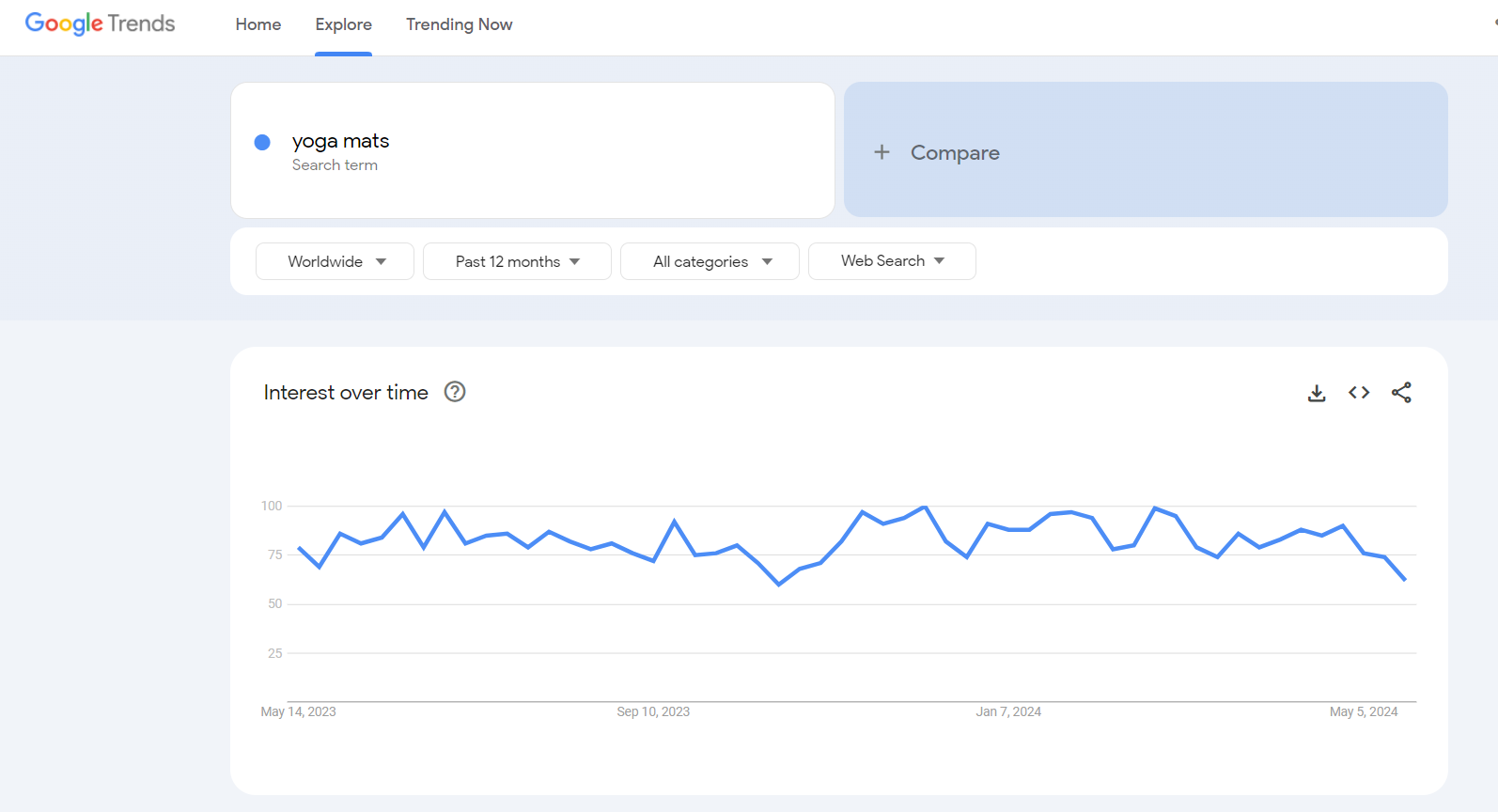
Moreover, what I personally do is use product research tools like Minea, and check on product demand, customer engagement, prices, and more.
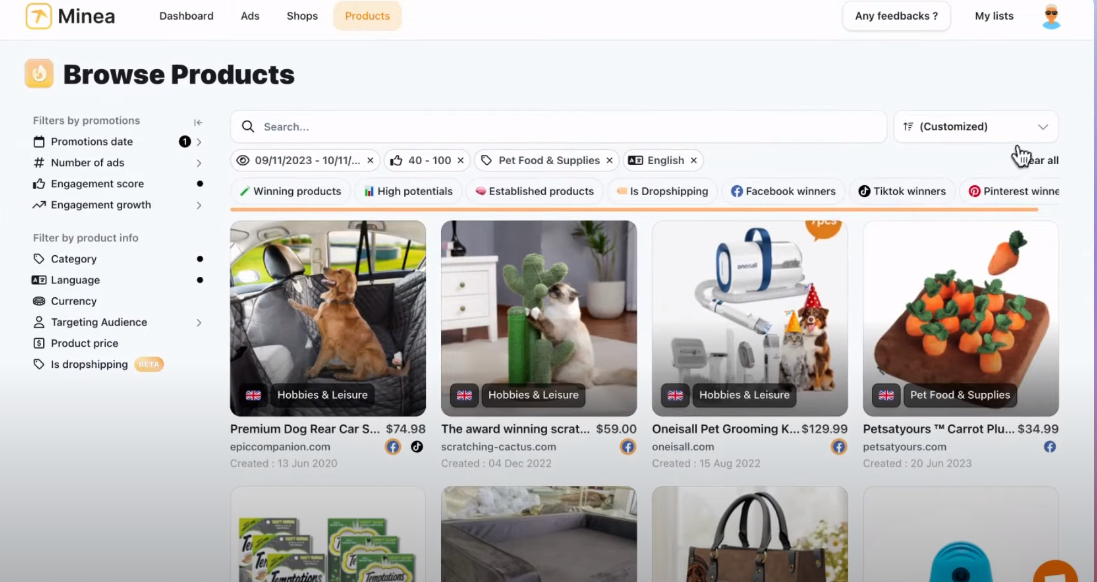
The best suppliers
Choosing the best dropshipping supplier to source products from can be hard, but not impossible.
If you work with an unreliable supplier, you are likely to receive complaints from your customers regarding missing items, wrong orders, delivery delays, etc.
So, it is best to choose the right one. Begin by doing your own research on Google and joining supplier directories. Then, you can attend trade shows and conferences.
Just do not forget to dive deep into what the supplier is offering: their product quality, minimum order requirements, service potential, and delivery times.
However, using Google as your only source to find dropshippnig suppliers might not be the best option. For instance, many supplier directories like Dropshipping.com or AutoDS actually have dozens of reliable dropshipping suppliers in any niche.
For instance, Dropshipping.com supplier directory lets you arrange suppliers based on categories, niches, or specific filters, including shipping costs, location, and product expenses. Best part? It’s completely free!
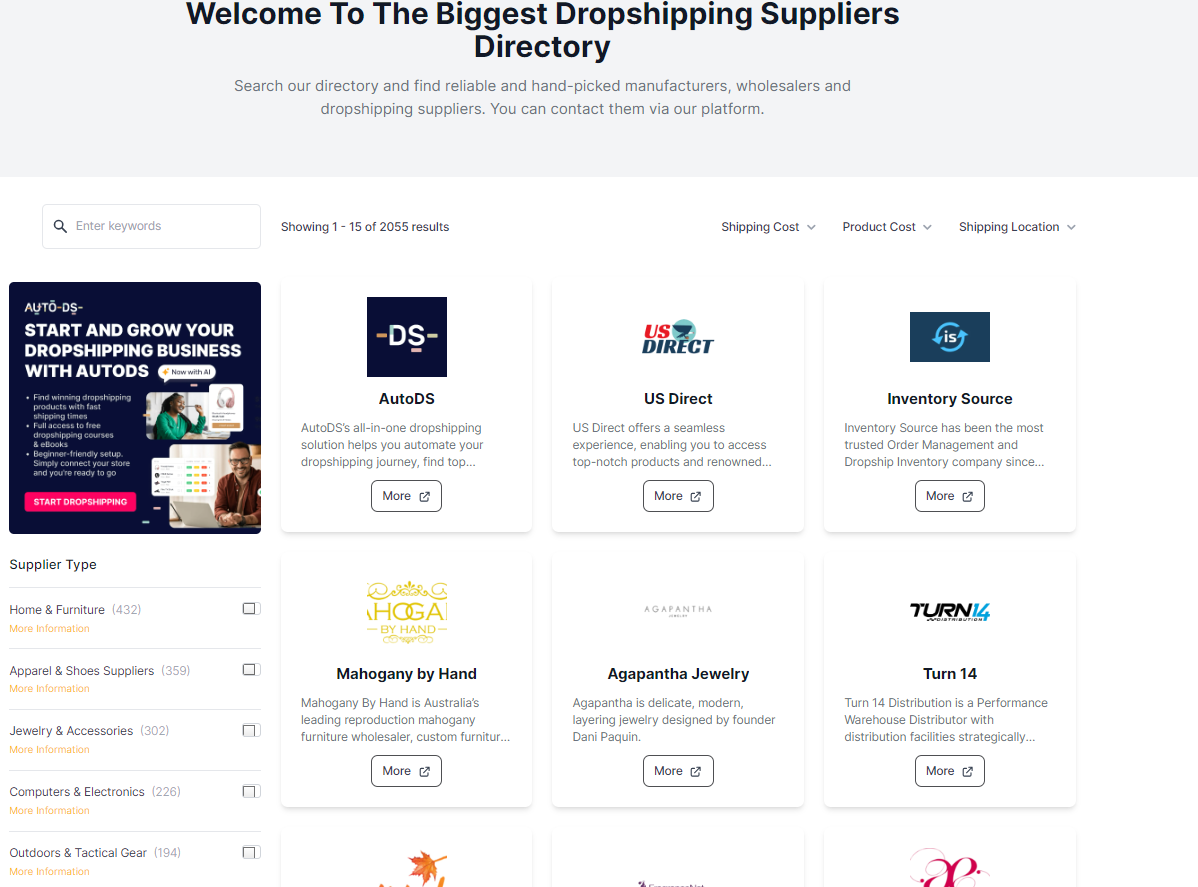
When you select a particular supplier, you’ll find all the essential details at your fingertips, like supplier description, location, product costs, average order processing time, shipping expenses, and the minimum order quantity (MOQ) requirement. Plus, their contact information is readily available for your convenience.
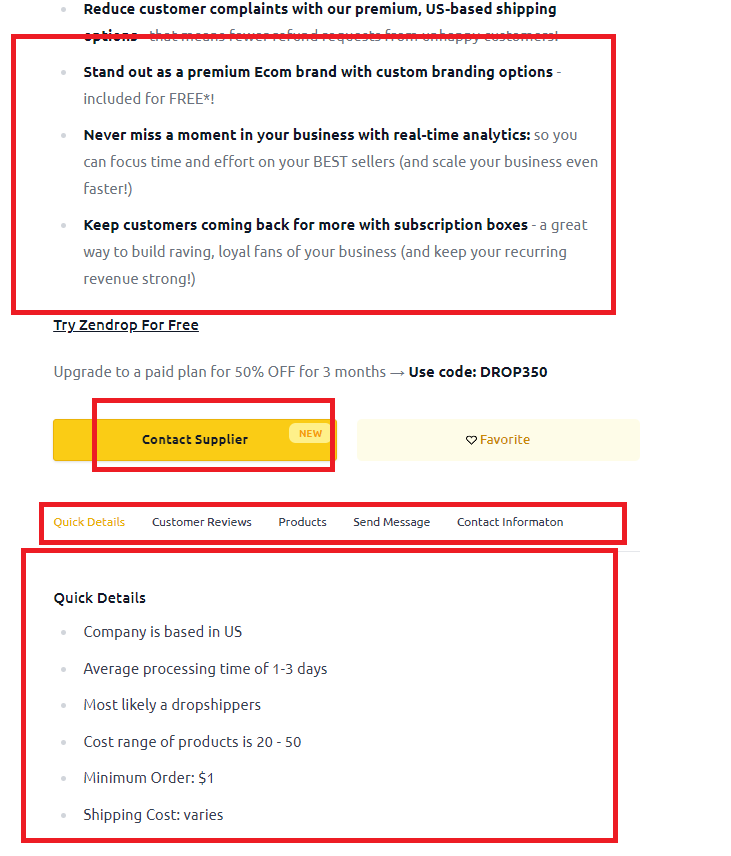
👉 Learn How To Connect a Dropshipping Supplier to Your Store?
AutoDS supplier directory is also a great choice. They’ve gathered a bunch of reliable suppliers from various parts of the world, including big names such as AliExpress, Amazon, Wayfair, CJDropshipping, and others.
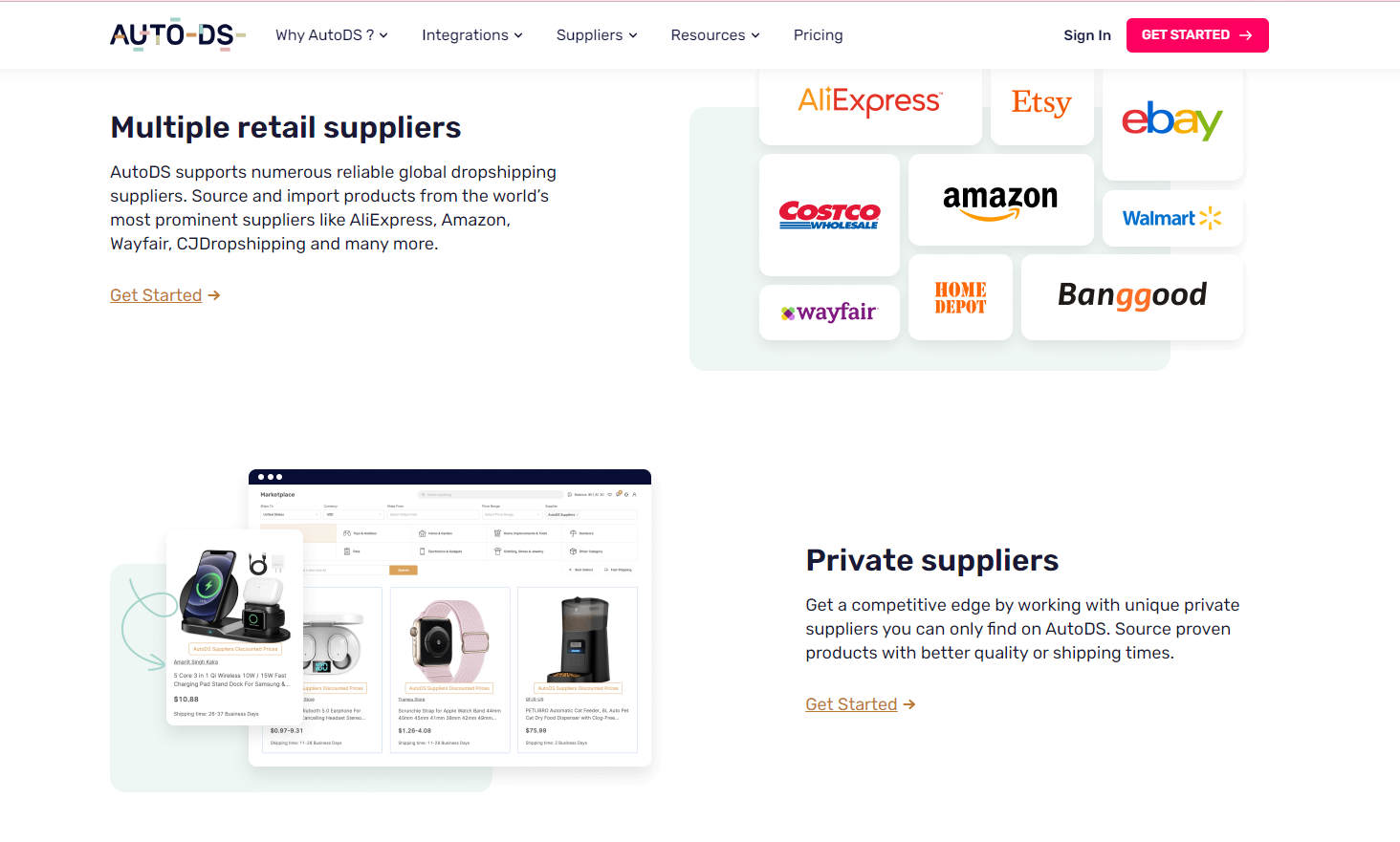
Plus, they have a warehouse located in China, adding convenience and safety to the mix.
2. Promote Your Dropshipping Business
In a market where it seems like everyone else is selling the same product, there has to be something that makes you stand out. So, you cannot say whether is dropshipping dead if you do not promote your business.
First things first, design your dropshipping store as a professional brand. Next, harmonize your website design with what you sell.
Good news is, there are plenty of website builders out there today. But, if you ask me, Shopify stands out as the go-to for dropshippers.
This platform is easy to use and gives you access to a variety of eye-catching themes, both free and paid, for your dropshipping store. On top of that, it packs a bunch of customizable features.
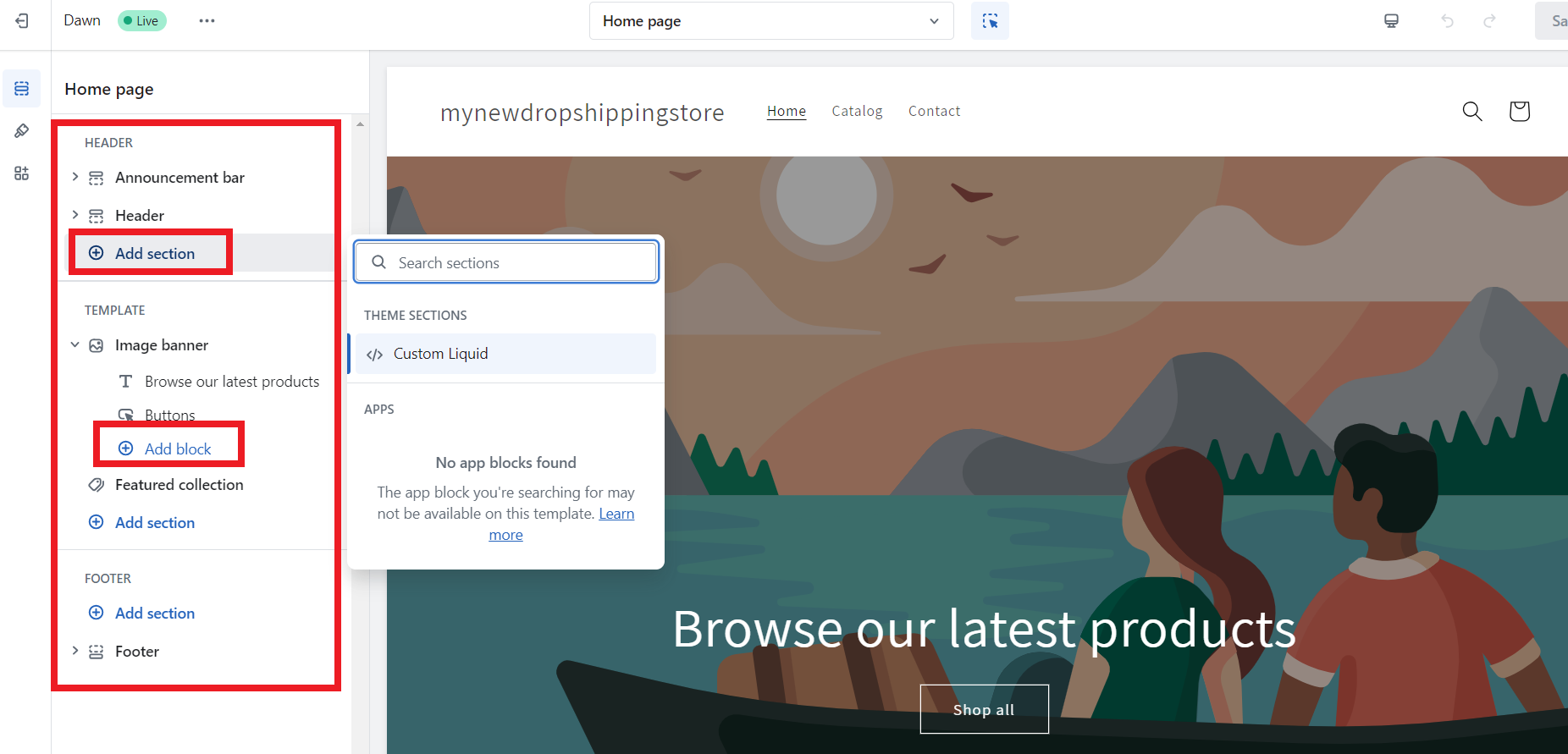
Then, integrate social media into your website design and design your shopping cart with customers in mind.
For example, consider incorporating a search engine optimization strategy, social media marketing, email campaigns, and paid advertising. To enhance sales, explore marketing tactics such as cross-selling, up-selling, offering discount codes, and creating referral programs.
Additionally, integrating video marketing into your dropshipping strategy can be effective. Utilize videos to showcase your products visually and demonstrate their usage, features, benefits, and more.
Plus, makes it easy for visitors to search for and purchase the products they need. And finally, promote your website to get your first sale.
Also, various automation marketing tools can help you simplify your work.
As stated earlier, the competition in the industry is fierce.
Remember that copying your competitors is the worst way to beat the competition. You cannot succeed in dropshipping in 2024 by doing that.
Instead, you need to create a good marketing strategy to stay one step ahead of your rivals.
👉 Read my Supliful Review: Is It Good For White Label Dropshipping?
3. Put The Customer First
In today’s world, how you sell has become as important as what you sell. So, instead of convincing yourself that dropshipping is dead, why not put an effort into succeeding your business?
It is as clear as day that putting the customer first is an excellent way to differentiate yourself from the competition and build loyalty among your customers.
Let us give an example. Suppose that you made a reservation at one of the best restaurants in town to celebrate your anniversary. This is a restaurant with white tablecloths, chic decor, a breathtaking view, and mouth-watering dishes.
That’s the reason for your reservation, right? But when you arrive there, the waiter is not so polite and the service is slow. The restaurant is also so noisy that you cannot even hear what your partner is trying to tell you.
Finally, you leave the place disappointed.
Unluckily, this is exactly the kind of experience that you could be setting your customers up for if you focus solely on what you sell and not how you sell.
For example, I use Tidio to easily interact with my customers and answer all of their questions. 👇
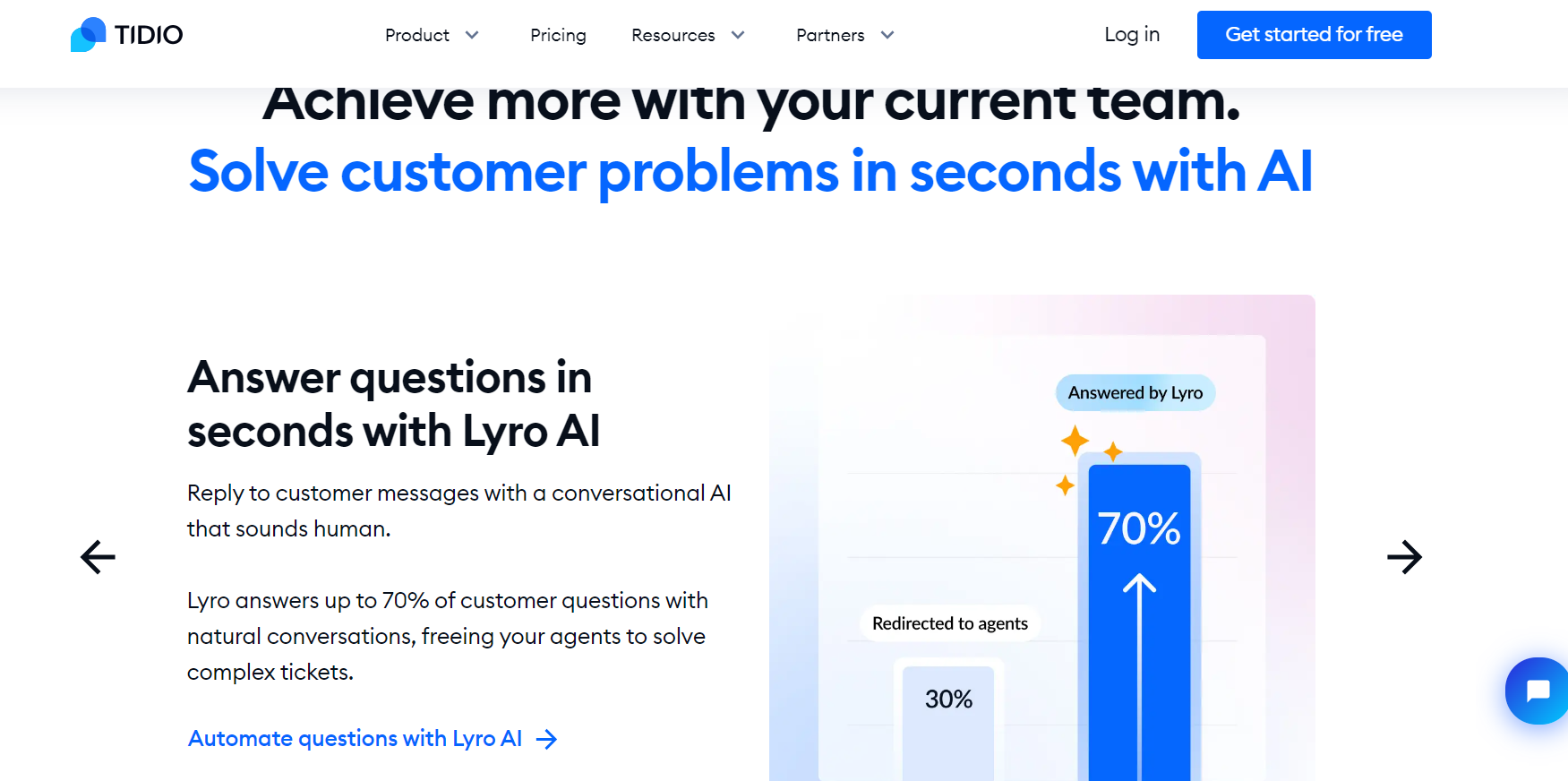
So why not provide impeccable customer service and acquire customers who will buy from your dropshipping store for years to come?
💡 LEARN: What Does Shipped Mean In Dropshipping?
FAQs about Dropshipping
1. Is dropshipping legal?
Absolutely, dropshipping is completely legal. Engaging in dropshipping doesn’t involve any unlawful activities and is a valid way to conduct business. It’s crucial, however, for dropshippers to adhere to local laws and regulations, ensuring they obtain the required licenses and permits.
2. Is dropshipping profitable?
Certainly, dropshipping can be a profitable venture when executed correctly. According to the most recent data, the global dropshipping industry is projected to reach $301.11 billion in 2024. Additionally, experts anticipate the business to be valued at $500 billion by 2027.
What are some dropshipping product ideas?
Dropshipping opens up a wide range of product possibilities. Popular niches include fashion accessories, home decor, beauty products, and electronics.
Thus, utilizing trend research tools like Adserea, Sell The Trend, or Minea can help identify emerging markets such as eco-friendly products, pet supplies, or fitness equipment.
3. Do I need to register a business entity to dropship?
Yes, it’s generally recommended to register a business entity before starting a dropshipping business. To register in the US, follow these steps:
- Choose a business name.
- Decide on a business structure (like sole proprietorship, partnership, LLC, or corporation).
- Register your business with the appropriate government authorities.
- Obtain an EIN from the IRS.
- Acquire necessary licenses and permits.
- Set up a business bank account.
- Understand sales tax obligations.
- Comply with federal regulations.
- Obtain business insurance.
- Create a professional website.
Always consult with a legal or business professional to ensure compliance with local, state, and federal regulations.
👉 Read about LLC vs LLP: What’s The Big Difference?
4. Is Dropshipping Dead?
In short, Dropshipping is far from dead and shows no signs of slowing down. And, we’ve witnessed its effectiveness firsthand and verified it through global eCommerce market size statistics and Google searches.
Thus, the platform is expected to reach $301.11 Billion in 2024. Plus, as on Google Trends, dropshipping has shown growth in the past year.
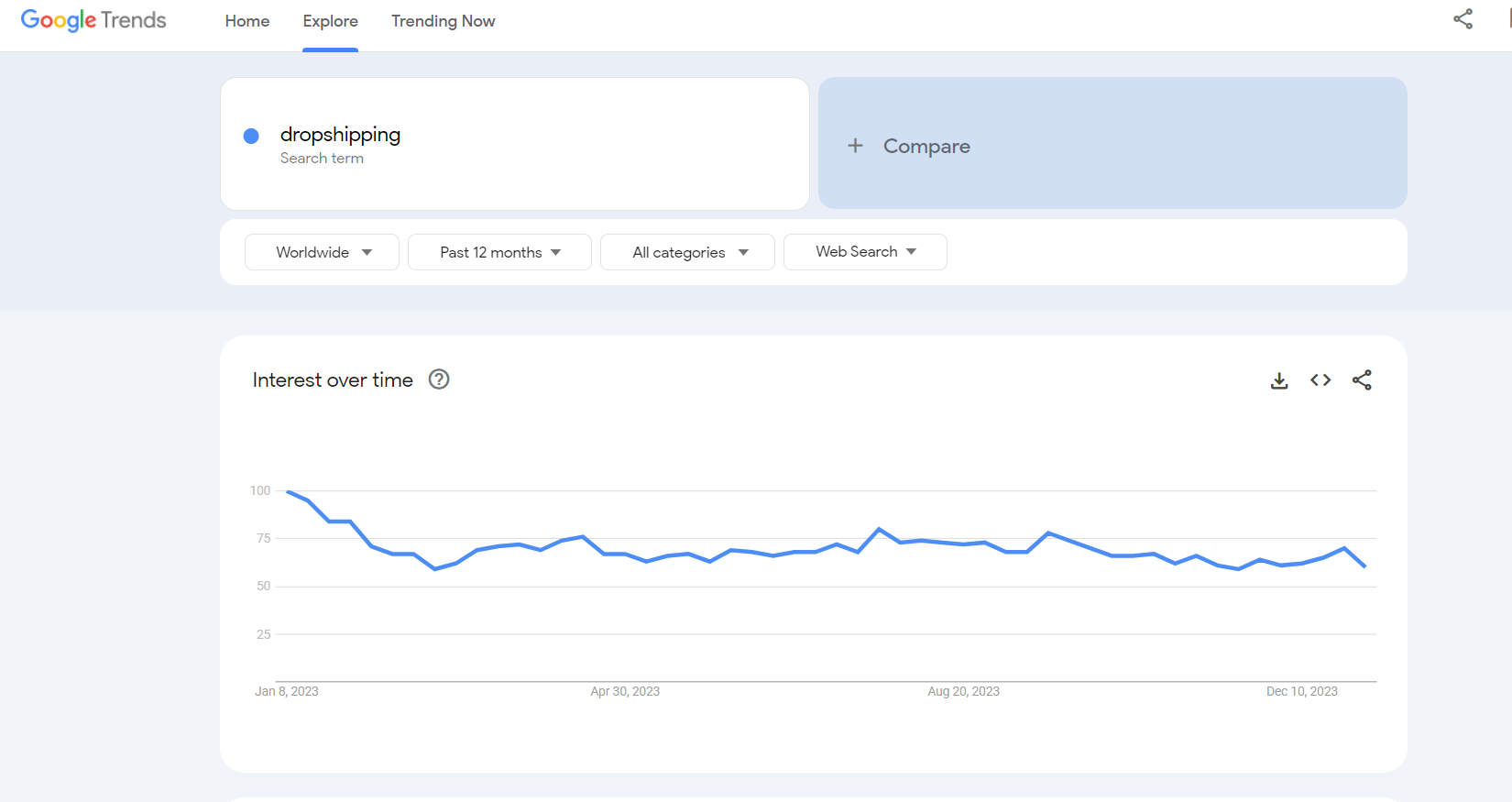
So, the dropshipping business model continues to thrive, and it seems like is very much alive!
5. Can I Get Rich With Dropshipping?
The dropshipping model is low-risk and highly profitable, capable of becoming a full-time income source.
Success, however, requires developing skills in areas like copywriting and paid advertising. Getting rich quickly is challenging without learning these valuable skills, but with patience and the right approach, it’s possible!
6. Can I Start Dropshipping With No Money?
Certainly! You can start dropshipping with no money, though there are both advantages and disadvantages to this approach.
👉 Check out the Free Dropship Websites: Start Dropshipping With $0.
7. Can I Start a Dropshipping Business As a Teen?
Absolutely! Despite a few challenges, teens can start a dropshipping store. The main obstacle involves not having a personal bank account or ID for verification.
A workaround is to use a parent’s or older sibling’s bank account for transactions.
👉 Read about How Old Do You Have To Be To Dropship? A Guide For Age 15, 16, 17, 18.
Also, check out the Best Ecommerce Business Ideas For Teens in 2024


Conclusion
As you can see, the right answer to the question “Is dropshipping dead in 2024” is no, it is not dead.
You can finally put your worries and fears to rest.
Ultimately, you are the only one who determines your own success.
With a lot of patience and the perfect strategy, you can start a dropshipping business and succeed in the industry.













![The Top 21 3PL Companies Compared [2024 List & Guide]](https://images.weserv.nl/?url=https://prod-dropshipping-s3.s3.fr-par.scw.cloud/2024/03/Frame-3922469.jpg&w=420&q=90&output=webp)